- Home
- Studs Terkel
The Studs Terkel Reader_My American Century Page 8
The Studs Terkel Reader_My American Century Read online
Page 8
I remember men in the South who were yard boys, never called mister, who were considered Uncle Toms. But their children looked up to them. At home, they represented somebody trying. The janitor in the school where my father was principal was chairman of the board of trustees of the church my dad attended. This will never happen again in our lifetime.
Old man Van Dyke, who worked the city streets, walked around with great poise. Shack Wilkins, who worked at the L & N Railroad, over at the shops, I remember how he kept his shoes shined. Wow. I still do this on Saturdays. I’m imitating Shack Wilkins. He used to buy expensive shoes, Thom McAns. We called them expensive. Boy! He kept them shining. He used to take us chestnut hunting.
On Sundays, they dressed immaculately. We kept our outhouse clean, as many other people did. You shovel out the fecund and put it in a deep post hole and you put lime over it.
When you come to a city like Chicago, you get lost in the crowd. You’re just another name. If a kid uses the word “motherfucker,” he can do it with impunity because this old lady walking down the street doesn’t know him. She doesn’t know his mother or his father. You can hear ’em: “Kiss my ass, motherfucker. Go to hell.” All this stuff, when some older people are coming by. Sometimes, out of habit, I say: “Can’t you respect the sisters, man?” Then they’ll calm down.
I remember I was caught playing the dozens once. It’s a game of insults that blacks play, where a bunch of kids get together and hit at what they consider your weakest point: your mother. You don’t have much else to lose really. “Motherfucker” is not a sweet little name. It means you’re the lowest son of a bitch on earth. Mother was the one thing that was permanent in your life, even in slavery. Today, with these kids, it’s no longer a game. It’s a way of life.
If I’m feeling good and want to have my morale lowered, all I have to do is drive out Madison Street on a bright, beautiful day and look at the throngs of unemployed youngsters in their weird dress, trying to hang on to some individuality. Can’t read or write, looking mean at each other. You see kids hanging around, hating themselves as much as they hate others. This is one thing that’s contributed to the ease with which gangs kill each other. Another nigger ain’t nothin’.
In Englewood, we had a little bay window. I had formed a cooperative. We tried to fix it up and eventually lost it. But it was a pretty good experiment. We weren’t trying to leave the ghetto. We were gonna stay there. We were sitting there, watching TV We had our windows up. There was a walkway alongside. I heard what appeared to be an explosion. I had one of those Mattel guns. Have you seen these toy guns? They’re very realistic. This gun looked like a high-powered rifle. Someone had given it to my sons for Christmas. It gives you an indication of the kind of toys they’re selling. [Laughs.] I grabbed this gun because I didn’t know if somebody was trying to break in.
Here was an unarmed black kid sauntering in the gangway. He had evidently leaped up, hit a light bulb, and made it explode. I thought when he saw me coming down with a gun drawn—it looked like the real thing—he would have held up his hands and said: “Don’t shoot, mister, I was just playing.” He didn’t do a thing but look at me out of the side of his head and say: “What are you excited about, motherfucker? Go ahead and shoot.” He didn’t give a damn. This kid went away into anonymity.
We have become anonymous. We got lost. When I was coming up, the so-called ghettos had a stability, would you believe it? People didn’t move as much as they do today. Folk had a chance to know who was living down the street, who graduated, who got married. All the black people went to the same churches. All the college graduates came home for Christmas. You had to get up and make a little talk. Your folks wanted to show you off.
You had an inspiration to go to college. But now your inspiration is to become, maybe, a hell of a basketball player because you heard about Cazzie Russell makin’ it with the pros. You might want to become an O.J. Simpson because you see him on television. You might want to become a big-time singer ’cause you know Curtis Mayfield lived near the el tracks. But if you can’t cut these things, where is your inspiration coming from? A lot of things have contributed to the death of inspiration, outside of race. You got a lot of white people who can’t live without an excess of alcohol to keep ’em going because they feel imprisoned, too.
The city is not heaven any more. It is more of a refuge. It is not a city of hope. The whites are victims, too. They have no power. Being white has not paid off for them, but it’s the only thing they’ve got. We have to work out a strategy to give ordinary people power. We’ve been bullshitting ourselves. We always were every man for himself, while we talked idealism. There must be a new way of thinking.
C. P. ELLIS
We’re in his office in Durham, North Carolina. He is the business manager of the International Union of Operating Engineers. On the wall is a plaque: “Certificate of Service, in recognition to C. P. Ellis, for your faithful service to the city in having served as a member of the Durham Human Relations Council. February 1977.”
At one time, he had been president (exalted cyclops) of the Durham chapter of the Ku Klux Klan...
He is fifty-three years old.
My father worked in a textile mill in Durham. He died at forty-eight years old. It was probably from cotton dust. Back then, we never heard of brown lung. I was about seventeen years old and had a mother and sister depending on somebody to make a livin’. It was just barely enough insurance to cover his burial. I had to quit school and go to work. I was about eighth grade when I quit.
My father worked hard but never had enough money to buy decent clothes. When I went to school, I never seemed to have adequate clothes to wear. I always left school late afternoon with a sense of inferiority. The other kids had nice clothes, and I just had what Daddy could buy. I still got some of those inferiority feelin’s now that I have to overcome once in a while.
I loved my father. He would go with me to ball games. We’d go fishin’ together. I was really ashamed of the way he’d dress. He would take this money and give it to me instead of putting it on himself. I always had the feeling about somebody looking at him and makin’ fun of him and makin’ fun of me. I think it had to do somethin’ with my life.
My father and I were very close, but we didn’t talk about too many intimate things. He did have a drinking problem. During the week, he would work every day, but weekend he was ready to get plastered. I can understand when a guy looks at his paycheck and looks at his bills, and he’s worried hard all the week, and his bills are larger than his paycheck. He’d done the best he could the entire week, and there seemed to be no hope. It’s an illness thing. Finally you just say: “The heck with it. I’ll just get drunk and forget it.”
My father was out of work during the depression, and I remember going with him to the finance company uptown, and he was turned down. That’s something that’s always stuck.
My father never seemed to be happy. It was a constant struggle with him just like it was for me. It’s very seldom I’d see him laugh. He was just tryin’ to figure out what he could do from one day to the next.
After several years pumping gas at a service station, I got married. We had to have children. Four. One child was born blind and retarded, which was a real additional expense to us. He’s never spoken a word. He doesn’t know me when I go to see him. But I see him, I hug his neck. I talk to him, tell him I love him. I don’t know whether he knows me or not, but I know he’s well taken care of. All my life, I had work, never a day without work, worked all the overtime I could get and still could not survive financially. I began to say there’s somethin’ wrong with this country. I worked my butt off and just never seemed to break even.
I had some real great ideas about this great nation. [Laughs.] They say to abide by the law, go to church, do right and live for the Lord, and everything’ll work out. But it didn’t work out. It just kept gettin’ worse and worse.
I was workin’ a bread route. The highest I made one week was se
venty-five dollars. The rent on our house was about twelve dollars a week. I will never forget: outside of this house was a 265-gallon oil drum, and I never did get enough money to fill up that oil drum. What I would do every night, I would run up to the store and buy five gallons of oil and climb up the ladder and pour it in that 265-gallon drum. I could hear that five gallons when it hits the bottom of that oil drum, splatters, and it sounds like it’s nothin’ in there. But it would keep the house warm for the night. Next day you’d have to do the same thing.
I left the bread route with fifty dollars in my pocket. I went to the bank and I borrowed four thousand dollars to buy the service station. I worked seven days a week, open and close, and finally had a heart attack. Just about two months before the last payments of that loan. My wife had done the best she could to keep it runnin’. Tryin’ to come out of that hole, I just couldn’t do it.
I really began to get bitter. I didn’t know who to blame. I tried to find somebody. I began to blame it on black people. I had to hate somebody. Hatin’ America is hard to do because you can’t see it to hate it. You gotta have somethin’ to look at to hate. [Laughs.] The natural person for me to hate would be black people, because my father before me was a member of the Klan. As far as he was concerned, it was the savior of the white people. It was the only organization in the world that would take care of the white people. So I began to admire the Klan.
I got active in the Klan while I was at the service station. Every Monday night, a group of men would come by and buy a Coca-Cola, go back to the car, take a few drinks, and come back and stand around talkin’. I couldn’t help but wonder: Why are these dudes comin’ out every Monday? They said they were with the Klan and have meetings close-by. Would I be interested? Boy, that was an opportunity I really looked forward to! To be part of somethin’. I joined the Klan, went from member to chaplain, from chaplain to vice-president, from vice-president to president. The title is exalted cyclops.
The first night I went with the fellas, they knocked on the door and gave the signal. They sent some robed Klansmen to talk to me and give me some instructions. I was led into a large meeting room, and this was the time of my life. It was thrilling. Here’s a guy who’s worked all his life and struggled all his life to be something, and here’s the moment to be something. I will never forget it. Four robed Klansmen led me into the hall. The lights were dim, and the only thing you could see was an illuminated cross. I knelt before the cross. I had to make certain vows and promises. We promised to uphold the purity of the white race, fight communism, and protect white womanhood.
After I had taken my oath, there was loud applause goin’ throughout the buildin’, musta been at least four hundred people. For this one little ol’ person. It was a thrilling moment for C. P. Ellis.
It disturbs me when people who do not really know what it’s all about are so very critical of individual Klansmen. The majority of’em are low-income whites, people who really don’t have a part in something. They have been shut out as well as the blacks. Some are not very well educated either. Just like myself. We had a lot of support from doctors and lawyers and police officers.
Maybe they’ve had bitter experiences in this life and they had to hate somebody. So the natural person to hate would be the black person. He’s beginnin’ to come up, he’s beginnin’ to learn to read and start votin’ and run for political office. Here are white people who are supposed to be superior to them, and we’re shut out.
I can understand why people join extreme right-wing or left-wing groups. They’re in the same boat I was. Shut out. Deep down inside, we want to be part of this great society. Nobody listens, so we join these groups.
At one time, I was state organizer of the National Rights party. I organized a youth group for the Klan. I felt we were getting old and our generation’s gonna die. So I contacted certain kids in schools. They were havin’ racial problems. On the first night, we had a hundred high school students. When they came in the door, we had “Dixie” playin’. These kids were just thrilled to death. I begin to hold weekly meetin’s with ‘em, teachin’ the principles of the Klan. At that time, I believed Martin Luther King had Communist connections. I began to teach that Andy Young was affiliated with the Communist party.
I had a call one night from one of our kids. He was about twelve. He said: “I just been robbed downtown by two niggers.” I’d had a couple of drinks and that really teed me off. I go downtown and couldn’t find the kid. I got worried. I saw two young black people. I had the .32 revolver with me. I said: “Nigger, you seen a little young white boy up here? I just got a call from him and was told that some niggers robbed him of fifteen cents.” I pulled my pistol out and put it right at his head. I said: “I’ve always wanted to kill a nigger and I think I’ll make you the first one.” I nearly scared the kid to death, and he struck off.
This was the time when the civil rights movement was really beginnin’ to peak. The blacks were beginnin’ to demonstrate and picket downtown stores. I never will forget some black lady I hated with a purple passion. Ann Atwater. Every time I’d go downtown, she’d be leadin’ a boycott. How I hated—pardon the expression, I don’t use it much now—how I just hated that black nigger. [Laughs.] Big, fat, heavy woman. She’d pull about eight demonstrations, and first thing you know they had two, three blacks at the checkout counter. Her and I have had some pretty close confrontations.
I felt very big, yeah. [Laughs.] We’re more or less a secret organization. We didn’t want anybody to know who we were, and I began to do some thinkin’. What am I hidin’ for? I’ve never been convicted of anything in my life. I don’t have any court record. What am I, C. P. Ellis, as a citizen and a member of the United Klansmen of America? Why can’t I go the city council meeting and say: “This is the way we feel about the matter? We don’t want you to purchase mobile units to set in our schoolyards. We don’t want niggers in our schools.”
We began to come out in the open. We would go to the meetings, and the blacks would be there and we’d be there. It was a confrontation every time. I didn’t hold back anything. We began to make some inroads with the city councilmen and county commissioners. They began to call us friend. Call us at night on the telephone: “C. P., glad you came to that meeting last night.” They didn’t want integration either, but they did it secretively, in order to get elected. They couldn’t stand up openly and say it, but they were glad somebody was sayin’ it. We visited some of the city leaders in their home and talk to ’em privately. It wasn’t long before councilmen would call me up: “The blacks are comin’ up tonight and makin’ outrageous demands. How about some of you people showin’ up and have a little balance?” I’d get on the telephone: “The niggers is comin’ to the council meeting tonight. Persons in the city’s called me and asked us to be there.”
We’d load up our cars and we’d fill up half the council chambers, and the blacks the other half. During these times, I carried weapons to the meetings, outside my belt. We’d go there armed. We would wind up just hollerin’ and fussin’ at each other. What happened? As a result of our fightin’ one another, the city council still had their way. They didn’t want to give up control to the blacks nor the Klan. They were usin’ us.
I began to realize this later down the road. One day I was walkin’ downtown and a certain city council member saw me comin’. I expected him to shake my hand because he was talkin’ to me at night on the telephone. I had been in his home and visited with him. He crossed the street. Oh shit, I began to think, somethin’s wrong here. Most of ’em are merchants or maybe an attorney, an insurance agent, people like that. As long as they kept low-income whites and low-income blacks fightin’, they’re gonna maintain control.
I began to get that feeling after I was ignored in public. I thought: Bullshit, you’re not gonna use me any more. That’s when I began to do some real serious thinkin’.
The same thing is happening in this country today. People are being used by those in control, those who have all
the wealth. I’m not espousing communism. We got the greatest system of government in the world. But those who have it simply don’t want those who don’t have it to have any part of it. Black and white. When it comes to money, the green, the other colors make no difference. [Laughs.]
I spent a lot of sleepless nights. I still didn’t like blacks. I didn’t want to associate with ‘em. Blacks, Jews, or Catholics. My father said: “Don’t have anything to do with ’em.” I didn’t until I met a black person and talked with him, eyeball to eyeball, and met a Jewish person and talked to him, eyeball to eyeball. I found out they’re people just like me. They cried, they cussed, they prayed, they had desires. Just like myself. Thank God, I got to the point where I can look past labels. But at that time, my mind was closed.
I remember one Monday night Klan meeting. I said something was wrong. Our city fathers were using us. And I didn’t like to be used. The reactions of the others was not too pleasant: “Let’s just keep fightin’ them niggers.”
I’d go home at night and I’d have to wrestle with myself. I’d look at a black person walkin’ down the street, and the guy’d have ragged shoes or his clothes would be worn. That began to do somethin’ to me inside. I went through this for about six months. I felt I just had to get out of the Klan. But I wouldn’t get out.
Then something happened. The state AFL-CIO received a grant from the Department of HEW, a $78,000 grant: how to solve racial problems in the school system. I got a telephone call from the president of the state AFL-CIO. “We’d like to get some people together from all walks of life.” I said: “All walks of life? Who you talkin’ about?” He said: “Blacks, whites, liberals, conservatives, Klansmen, NAACP people.”
I said: “No way am I comin’ with all those niggers. I’m not gonna be associated with those type of people.” A White Citizens Council guy said: “Let’s go up there and see what’s goin’ on. It’s tax money bein’ spent.” I walk in the door, and there was a large number of blacks and white liberals. I knew most of ’em by face ‘cause I seen’em demonstratin’ around town. Ann Atwater was there. [Laughs.] I just forced myself to go in and sit down.

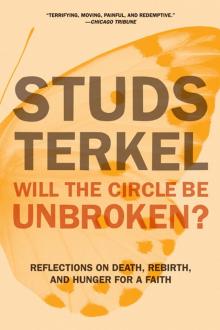 Will the Circle Be Unbroken?
Will the Circle Be Unbroken?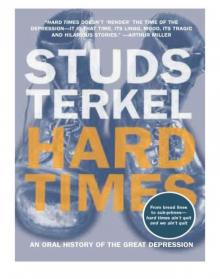 Hard Times
Hard Times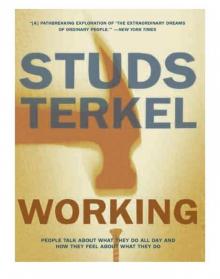 Working
Working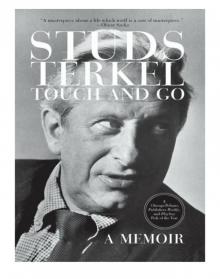 Touch and Go
Touch and Go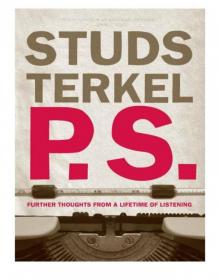 P.S.
P.S.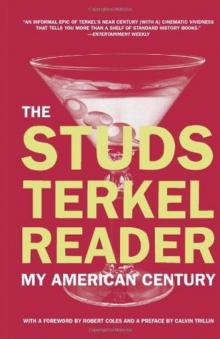 The Studs Terkel Reader_My American Century
The Studs Terkel Reader_My American Century